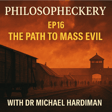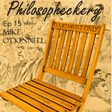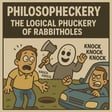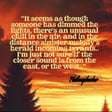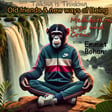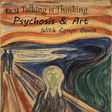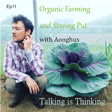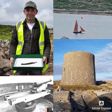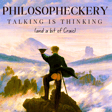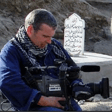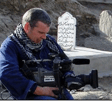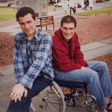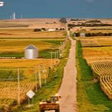Become a Creator today!Start creating today - Share your story with the world!
Start for free
00:00:00
00:00:01

Attending to Animals and Animal Attention, with Dr Nora Ward
Nora is an environmental philosopher that came on to speak about her latest work which explores attention in human and non human animals.
I hope this conversation stimulates reflection, as it did in me.
Recommended
Transcript
Introduction to COP 29 and Political Absences
00:00:00
Speaker
Hello listeners and thanks again for joining us on Talking is Thinking. Today is the 11th of November 2024 and it's the day that COP 29 begins. This is of course the international conference where the leaders of nations gather to discuss our collective response to climate change.
00:00:19
Speaker
World leaders not attending COP 29 include Vladimir Putin of Russia, Xi Jinping of China, Ola Schulz of Germany, Joe Biden of the USA, Brazilian President Lula da Silva, due to a head injury we might forgive Lula, EU Commission President Ursula von der Leyen, Emmanuel Macron of France, the Prime Minister of Netherlands, Dick Schueff, and a very auntie, Chuck Simon Harris.
Political Neglect of Climate Demands
00:00:45
Speaker
While the impact of these conferences is arguably negligible,
00:00:49
Speaker
Our conversation here today is around attention, and the absence of these world leaders at this conference seems to be a prime example of how little attention, politically at least, we are paying to the rest of nature and its demands on us. And to talk to us about attending to animals and animal attention, we have environmental philosopher, Dr.
Reciprocal Attention with Animals
00:01:11
Speaker
Nora Ward. Hello, Nora. Hello, Dahi. Thank you for having me.
00:01:16
Speaker
Thanks for coming. It's ah it's a great pleasure. um So tell us, Nora, about your your your new paper that has recently been released in the Journal of Animal Ethics called Attending to Animals and Animal Attention.
00:01:33
Speaker
Yeah, so it's a paper that's coming out sometime in the next month or so. And it focuses on the importance of two things. I guess first, attending to animals and to the natural world. But also secondly, it also focuses on being attended to by animals and the natural world.
00:02:00
Speaker
And so the impetus, and we can maybe talk about this in more detail um later as well, was that there does seem to be a lot of literature that focuses on the benefits of increased attentiveness to the natural world.
Ethical Implications of Reciprocal Attention
00:02:17
Speaker
But to some extent, it this literature doesn't take into account as much the sense in which we exist, not only as attenders, but also in these, what Deborah Byrd Rose calls, these wider networks of attention, in which we are also being received and understood and attended to by others.
00:02:38
Speaker
So the impetus of the article was to think a little bit more about um attention as reciprocal and the ethical consequences of that. okay
00:02:50
Speaker
ah reminds me the ah was told that using the word was the environment wasn't cool anymore, that I had to use the word ecology, but I always thought the word environment was fine, as long as we understood it as, although everything is my environment,
Critique of 'Environment' as a Passive Concept
00:03:06
Speaker
I'm a part of everything else's environment too. And is that perhaps something that you're saying might be missing, that we're not taking in the context of that we're actually been watched, we're actually been seen?
00:03:17
Speaker
Yeah, and I think that relates to the critique of the environment as a term, because I think some people see, the I guess the problem historically is that the environment, and I think non-humans in general, have been considered as passive in relation to the activity of humans. So the environment has functioned as a kind of backdrop.
00:03:42
Speaker
And the word environment doesn't do much to challenge that notion. So, I mean, I still use the word environment, it's it's okay, but that I think that's maybe where the where the critique comes from, but that also connects to what I'm considering in relation to attention. That kind of passivity in so far as animals and the natural world has been regarded as an object of our attention, so humans study and understand and perceive and judge it.
Nature as an Active Subject
00:04:11
Speaker
But they don't it's not as um common to have understood the natural world as a subject who attends back, who also perceives and maybe judges or queries a human in return. So I think it's kind of getting to that critique you're talking about, thinking about ways that we could challenge the way that the natural world has been considered to be a passive backdrop in relation to the kind of active a attending examination of the human. At least in the context of Western philosophy, we see that dichotomy um brought up quite a lot. um What inspired you to write about animal attention in this way?
Pandemic's Impact on Nature Engagement
00:04:52
Speaker
Well so a couple of things so i'll I'll talk about one maybe general thing that inspired me but also some personal examples as well. So one thing was that during so this a lot of people now are thinking about and attention in after the pandemic and the lockdowns ah and one particular case that interested me is I have a friend who works in Birdwatch Ireland and during the first lockdowns and the subsequent ah lockdowns as well Birdwatch Ireland started receiving like a lot of messages from people being like I have this really exotic bird in my garden can you identify it for me and most of the time the bird was like ah starting or a challenge like not at all exotic
00:05:40
Speaker
So on Birdwater Island, the staff had to be like, there's a traffic, you know, of course, very happy that people were, more people were contacting them and asking them to identify birds, but also like, that's just a rabbit and that's just a challenge. And so what seemed to be happening is that people were attending to their gardens, to the natural world, more or in a different way than before. So that birds they had in their garden, their whole lives that they hadn't seen, they started to see them.
00:06:10
Speaker
um And this actually connected, this is an example from Ireland, but it also connected globally to you see during kind of 2020 and 21 a massive increase in and people observing and also participating in wildlife records, so biodiversity information. And and also like bird very food sales went up, right? So so what this interesting connection between attention but also acts of caring for and the birds that they're seeing for the so-called first time.
00:06:42
Speaker
So that was something that really interested me about the ethical importance of attention. And I think as an environmental ethicist, at least for our environmental ethics as a discipline, especially in the earlier formulations, not much was talked about attention. um And I think
Environmental Ethics and Attentiveness
00:06:59
Speaker
there's been perhaps an underestimation of how important attention is. Like in the earlier environmental ethics debates,
00:07:07
Speaker
It was a lot about um valuation. How do we value the natural world? Do we value it instrumentally um as a resource for us? Or do we value it in and of itself? And I guess I think there's a sense in which, for many people, it's not even noticed, never mind, valued in one way or the other. And here there's a kind of, and inspired by this Italian philosopher, Silvia Panizzi, who says like there's a kind of a harm in not seeing.
00:07:36
Speaker
And that harm was not really acknowledged so much, at least in the traditional environmental ethics literature. So that those were my um inspirations and also just a personal inspiration when I moved back from the US into the burn region and I took on a bit of a project for myself to learn the native plants.
00:07:57
Speaker
ah through like photography and it was like wait like let's see how many I can learn and personally I was just completely amazed at first how much I had not noticed before this project like how many times I had walked by the flower and just not seen the flower And then also how much I did notice after I started noticing. It was like the world literally just opened up in a way that was that was emotional and surprising. And so I guess it was the combination of that personal experience and also these these other examples from the pandemic and and the environmental ethics literature.
00:08:38
Speaker
that's a Yeah, that's good. That's a nice way to come about it. yeah you have You have two impetuses there for this kind of thinking. And which philosophical traditions or thinkers do you think influenced your work more
Philosophical Influences: Weil and Murdoch
00:08:52
Speaker
on animality?
00:08:53
Speaker
Yeah, so when I started getting interested in the theory of attention and then the account of attention, I started first looking to the primary attention scholars within philosophy and moral philosophy. So two two big ones are Simone Weil and Iris Murdoch, and Murdoch is is influenced by Weil and they have a lot of interesting similarities.
00:09:18
Speaker
And um so they they were my main influence. And in this article that we're talking about today, I end up kind of to some extent challenging their work or supplementing their work to some extent, but um that they were they were my kind of original influences among some others in environmental ethics as well.
00:09:40
Speaker
And like will I talk a little bit about their accounts? Yeah. Tell us a bit about their accounts of attention and and how maybe you're trying to bring that. Yeah. So I think um simone both Simone Weil and Iris Mardach were influenced by the kind of larger sympathy tradition and moral philosophy that has been attributed to to Hume and others.
00:10:03
Speaker
And so there's a couple of starting points of their work that connects to that. The first being that they're not him both philosophers are not so much interested in like action or choices, which you see in a lot of other normative frameworks, like say utilitarianism or Kantian ethics. There's a kind of focus on what is the best action to do or how can we create rules that will inform action.
00:10:31
Speaker
And they were not so much interested in action, but rather in perception or in vision or in moral vision. Insofar as, like it's for them, it's not really important about what actions we take, but rather like how we actually see and perceive the world and how we engage with the world. And then good or bad actions flow from our perception. But the perception is the fundamental moral engagement with the world.
00:10:56
Speaker
So, as moral agents, our job is to get good perception. But then it's like, how do we do that? And so for them, a kind of second starting point then is a kind of conceptualization of human nature, which is apparent in both of their accounts.
00:11:13
Speaker
which points to, which kind of understands human nature in a bit of a negative light, in so far as they argue that like humans are self-oriented or ego-driven, like naturally to some extent. Murdoch says, like we are driven by the fat, relentless relentless ego that wants to devour everything. and Around what period of time did these ladies exist?
00:11:38
Speaker
Like, so the kind of 20th century, yeah. So modern. Early 20th century. Yeah, yeah, exactly. So just after Second World War. Yeah, around that time. Yeah, exactly, and after. Yeah. Like I can totally see where they're getting these ideas from. Sure, sure. Yeah, exactly. And so that's the problem with seeing well, is the ego. So for them, it's like the ego is always filtering and projecting.
00:12:05
Speaker
And that filtering and projecting process distorts the other. So it's like you might want to you know see your neighbor in as true a light as possible, but you also are a little bit jealous that they got this new car. ah here And that jealousy starts clouding your vision. So the idea of this like your own kind of narcissistic desires clouding your vision and distorting the other, that's like their main concern. And so for them, attention is, well, it's what Murdoch calls the unself. It's actually seeing the other for who they really are beyond the the kind of terrible, devouring nature of the ego.
00:12:52
Speaker
um And so like Bey says that you know ideally the eye should disappear in the attentive act.
Self-Perception and Ego in Attention
00:13:02
Speaker
Yeah, this is one thing I was thinking of. It seems Simone Weil wants to, is it self-emptying? She calls it self-empty, the the ego. so So get rid of the ego completely.
00:13:16
Speaker
and Murdoch wants us to transcend the ego, so almost build upon us in a certain sense. I'm wondering how you got the balance between them things or did you pick a side? So there's a lot of interpretation and philosophical interpretation about where the self ends up. So first we're saying the self is a real thing.
00:13:39
Speaker
yeah um Yeah, that's complicated because Murdoch says the self is an illusion. so um and so and I don't really consider myself to to be a Murdoch or Bay scholar, so I'm always being informed by by better people than I in this. But there is at least a sense in which Murdoch calls, ah sorry, they calls for a bit more of a a more radical ah boundary collapse between self and other. Some people have actually you know connected her to Buddhist thought in so far as the self is a the illusion which which curtails our connection with others and in attention we can collapse that self-other distinction. Murdoch then
00:14:26
Speaker
For Murdoch, you can see evidence in her work that she's really more interested in not getting rid of the self altogether, but the bad parts of the self, the egoism, like narcissism, and but keeping kind of some kind of an essential self which can then be changed for the better in the act of attention.
00:14:48
Speaker
So they there's this interpretation in terms of their their differences and how we might understand the unself or um the disappeared self in their work, or what it might mean for as a way, they, she says, the self must become passive in the act of attention. So there's some interpretation out there. I mean, I ah guess in my work, I relate a little bit more to the Murdochian sense in which the self can be reconfigured rather than disappear altogether.
00:15:19
Speaker
Okay, we could do a whole episode just on the self and gone down that um down that rabbit hole. but So, let's go on a bit about the self actually. yeah does is I'm thinking of when we come to an animal or a non-human animal or the rest of nature.
00:15:38
Speaker
the self that we bring to us that has been uh that didn't fall out of space that was built by the social world that we find ourselves born into so how much of this is on the individual to go and bring this correct kind of attention, if that's the way to to speak about. And how much of it is on society to attune individuals to see nature in this way?
Societal Influence on Attentiveness
00:16:10
Speaker
Well, I think it has to be a combination. I mean, I think you see from the incidences from the pandemic and the lockdown that our institutional and social structures have a big part to play in it so that when we
00:16:25
Speaker
do take our foot off the accelerator for a while even though of course we had to do it in that time it wasn't a choice it was like a top-down imperative but when we had to stay home more ah when we had less opportunities to distract ourselves potentially that allows for different habits of attention and But that's not to say that there is no sense of the individual motivation or the individual action in that. I mean, we can in a way resist the and impetus of society to keep us very distracted and busy or on our phones.
00:17:06
Speaker
and slow down and take time to observe and attend to the natural world. um But that's again not to blame free people for not doing that because I think socially they there is a counter current in which that there is not a lot of space for that. I mean we talked about social media before we started here.
00:17:29
Speaker
and the way in which that is um designed to keep you on it as much as possible. I mean, I don't think social media platforms want you out there to spend an hour looking at birds necessarily. So um it's both, I guess. And we have to tackle, I mean, if there is and what some philosophers call a crisis of sensibility or a crisis of perception in which we have lost these ah knowledges about other living beings or even the ability to be to be attentive, then I think we have to tackle that in in a kind of varied way.
00:18:10
Speaker
i was I was reading just last night a guy called Morton who he started a place called Marymount. Do you know about Marymount in America? was that It was beside Plymouth Rock and there were there were another colony. But they became very close with the Native Americans. They married in. They partied together. they didn't have this puritanical kind of idealism but
00:18:42
Speaker
and What struck me was the way he wrote about the Native Americans. He said it's like they've got super senses. They've got supervision that they seem to know what all the animals are going to do and be doing and they can smell it. They can smell water. and Is this the kind of attention that you're talking about? is it I mean, is it a going back to a different type of attention or are we just striving for a brand new one?
00:19:05
Speaker
I definitely don't think it's a brand new one. I mean, our context is going to inform our
Cultural Differences in Nature Attention
00:19:10
Speaker
habits of attention. So if we are still living in an an extremely modern world, which we don't have to have those skills of attention in order to survive in a way that ah in cultures with less technology or who live in a so-called closer to the land, those skills are are necessary. I mean, so I think there's a and It's an interesting way that I think Western culture thinks about attending to nature. It's very enjoyment-focused. It's like, oh, let's go and look at the sea or go birdwatching. It's a hobby. like We kind of allocate it as leisure.
00:19:52
Speaker
um I mean, not not everyone's, I don't don't want to be too general, but in in a lot of cases it is. um But for other cultures and and existing and ancient cultures, it's it's not allocated in that way. It's just a basic skill that every human can develop. So we can ask ourselves, why why are we valuing some skills over others in our current society? And is there something Is there something wrong with that and should we resist that in some ways individuals?
00:20:26
Speaker
and But I don't I don't know. I don't know if they going back is is is a helpful And I would just to say like people often think about indigenous culprit cultures as if they don't exist in the present but they do there are still indigenous, you know, there are many indigenous cultures and I There are many people who who have to hunt to survive in in very industrialized countries too that do require those those skills and I think that those kind of skills do have a lot of ways that it it could help us and teach us in our society. Do you think there's any time or any era or epoch in particular that brought us away from attending to animals in that way? I mean I've heard us
00:21:12
Speaker
a guy called Daniel Schmacktenberger, he started the conciliates project, but I've heard him speaking of it and he um reckons that it happened when we first began agriculture.
Agriculture's Impact on Human-Animal Relations
00:21:22
Speaker
um For him, when we were hunter-gatherers, we were constantly thinking about the animals, what they were doing, where they'd be moving for water, what they'd want, what they'd like, what they need, you know, all the things we can think about when we think of other people. But then when we started agriculture, it meant we had to have an oxen and you could not have the same notion of this as a moral being worthy of care and stand behind it beaten all it, beaten it all day. So for him that was the moment, the agricultural kind of shift. I'm wondering, do you have any moment or do you maybe
00:21:59
Speaker
agree with that I think there's probably many moments. I think that could be certainly the shift to agriculture and to change the human nature relationship. And we see you know the these big arguments from people like Lin White Jr. in the early environmental ethics who blames agriculture and Christianity as as the kind of cause of anthropocentrism or the disconnect between man and nature. um So I think there are probably many moments. I certainly think
00:22:31
Speaker
ah increasing ah technology and the ah creation of like Albert Borgman, the philosopher, talks a lot about the commodity, which is the creation of the ah technological instrument that makes getting things as easy as possible, right the commodity being the the ultimate convenient object.
00:22:54
Speaker
so like you know you can before you had to cut the wood for the fire, now you can plug in the electric heater and you get the pleasure without any of the pain. So that's separation that of pain from pleasure, of benefit from exertion, in that it and is encapsulated in the kind of modern commodity and object. And we of course live in houses which are designed to be a perfect temperature for us, full of commodities.
Technology's Role in Human-Nature Disconnect
00:23:25
Speaker
That seems to be an important dis disconnector as well, or it maybe has has exacerbated the problem insofar as, why do we need to pay attention? and Why do we need to pay attention to the weather? if I mean we don't really depend on the weather really for livelihood or we can just go into our heated houses and so of course you yield lose skills like you lose a language if you don't use it you lose skills if you don't need them or if you don't use it so probably many moments and not linear not just like it gets worse and worse and worse so it is obviously varies across time and across cultures and and habits and so on yeah it's a
00:24:09
Speaker
It's funny, I died sometimes have been called a hippie and said, why don't why don't you just go out and live in a field? I'm like, I would if you can show me a field that has good hunting, good fishing, or you can grow stuff. And there's loads of other people like me happily. Difficult to find. It's very difficult to find. But nowadays when people say we're moving somewhere, it's like, yeah, but is is the where's the nearest Don's? You know, that's like, they're the most, they're our hunting grounds now.
00:24:36
Speaker
There's also, do you know the work of Sebastian Younger? He discusses kind of tribalism amongst combat soldiers and different groups and how when they when they go through dangerous moments and dangerous times together they get a very close bond and they don't only get that bond amongst themselves they actually get that bond with the enemy who they often meet years later and they both relate and they have this close bond
Extreme Weather as a Community Bonding Experience
00:25:09
Speaker
is Is there something like that missing between humans and nature? where Like you were saying, we we are now separated, but is there some in some sense a need for danger with nature that we're missing? that we Like you said, we we have no need to. There's nothing dangerous to us there anymore. If there is, we've either wiped it out or built a house around it. But there's something about the danger, I feel like, that that's needed to create that bond again.
00:25:38
Speaker
maybe and I think is well on the one hand like it is true to say that we are more separated but also that separation is an illusion of course because we are like however and we yes we may be in air-conditioned houses but we need like oxygen to survive and there are these moments, whether it's a virus that affects everyone like COVID-19 or an extreme weather event where we actually recognize in that moment, oh wait, we're not so safe. And in a way, things like extreme weather events and pandemics, they have a a lot of terrible and negative consequences.
00:26:23
Speaker
But they also are bonding opportunities. And you see in the aftermath of big storms, a lot of the common rhetoric is like, oh, the community was there for each other. like um And even now with Hurricane Helene, there's an amazing community community response that I'm sure in North Carolina transcends the so-called polarized political like climate.
00:26:51
Speaker
And so I do think there's something to it like we obviously we don't want to welcome disaster. But I think your point that we can see that being connected um to our material environment can bring us closer together and also recognize those connections maybe that were invisible before.
00:27:11
Speaker
or that we live our lives thinking that um I'm not connected to the natural world, but I go actually hang on a minute. There are these moments which which we can't can't hide that anymore. Absolutely. yeah I think we have a complete interdependence nature that we don't recognize. and and and there's a relationality that we did that we don't yeah and we want it we also want to recognize that in positive moments not only the the moments of emergency you know I'm just thinking of what somebody might come back on Twitter these days and it'll be something like oxygens for liberal aren oxygen
00:27:55
Speaker
okay
00:27:57
Speaker
Did you use any specific empirical studies to inform your philosophical analysis here? Yeah, so so I guess for me, some I might just like return a little bit to where I i supplement the work of Murdoch and Vey. So as I mentioned, I did start my own journey in attention, like in in plans and things like that. And so I was really very much informed by their work. And I connected to their theoretical framework, which is that when you do start to attend,
00:28:32
Speaker
all these other ethical things happen like you kind of automatically start to To care for and and love the natural world or you feel more connected or a sense of belonging and And you kind of gain that perspective so I kind of connected to all of that but I didn't so much connect to their emphasis on moving beyond the self. Vey says for example like the goal of attention is to see the landscape as if I am not there but here's me like having all this fun fun attending to plants and stuff and I'm like but I am here like I'm having a great time
00:29:20
Speaker
um and so And they do have quite um a negative and association with attention. I mean, Fervé and Murdoch attention is a very difficult process of self-sacrifice. And that didn't connect with but what I was feeling, actually, at all.
00:29:36
Speaker
And I also remember one um one moment that for some reason stood out to me. It was like a cold um winter day and so I was feeding the robins and a robin came really close to me and it was just this moment that the robin just cocked his head and looked straight at me.
00:29:54
Speaker
And I felt like, oh my god, this is so shocking. like And I was like, the Robin is looking at me. It's not just me unselfed as if I'm through an invisibility looking out and as this objective observer on the world in the world.
00:30:09
Speaker
I'm in it. I'm also being seen. I also kind of belong in this world. So I started to think about and maybe if what had been less emphasized in their account is the transformative ethical attention of being attended to in return and then attended to back.
00:30:29
Speaker
So from that, I started researching some some more empirical examples of animal attention and animal attending. And I love crows, so I had to go for the crows one. um So there's a couple of crow studies that are really interesting. and There's one kind of famous one done in Seattle. You probably maybe had known this before, the article about they were testing if crows can recognize ah human faces.
00:30:56
Speaker
And they put on masks, like a Dick Cheney mask, I think was one of them. And they started like... Also a particular human? Yeah, a particular... And then it turns out like i they the the crows started like dive bombing after they... So that they put on the mask, they started like abusing the crows in some way. And then every time the masked person would come back, the crows would start like attacking and dive bombing them.
00:31:18
Speaker
not only then, but years and years after. So they had obviously been attentive enough in order to distinguish between human faces and then obviously transmitted that information culturally, potentially. and Another one as well, and study smaller smaller sample size, looked at and crows being able to differentiate between Japanese and Dutch. As in language? Yes.
00:31:44
Speaker
and and because it was ah I think it was the the Japanese tourists were feeding them. So they were able to distinguish between when they when they played the Japanese or Dutch, they reacted differently. So I thought that was really interesting. And often those studies within the scientific community are thought about in terms of memory. They're like, oh, the crows have very good memory. But there is also, they can remember the faces, they can remember the masks. But it's also showcases an amazing ability to pay attention. And if you think about it, like humans don't even
00:32:16
Speaker
Most humans now don't even see crows, never mind be able to differentiate two different crows, or two different calls of crows, like in the and the article, like the call of an Icelandic versus a Californian raven. these are two i mean There are differences there, quite a lot of differences, but um it's often the case that humans wouldn't really attend or able to be able to pick up on that.
00:32:43
Speaker
And so it's actually a very impressive skill that these crows have, but I think it also connects to um our our broader sense that we know that our pets
Animal Attention Studies: Crows and Baboons
00:32:54
Speaker
pay attention to us because like they want food or that's the kind of reductionist idea.
00:33:00
Speaker
But I think we underestimate how, to the the extent that other wild animals or free living animals are also attending to us. um And there's an idea that, as Rose says, we think that nobody is listening. But actually, there are beings rings listening. That's why I hate that whole thing, like if a tree falls in the forest, no one is there to hear it.
00:33:26
Speaker
It's like, well, if it's as far as there are, there are ones there. they are look you'll see them flying away so so um So that's kind of what motivated those empirical studies as a way to get us to rethink the notion, I guess, again of passivity, but the sense in which we think nobody else is listening.
00:33:49
Speaker
it's funny i used to live in kaammera and i used to live in a house with a lot of dogs and a wonderful person who used to mind the dogs and had a wonderful way about um her with the dogs. But there was another chap who lived alongside us. Martin was his name. And Martin was a real native Connemara man. He once told me, he said, if the apocalypse happens, doesn't matter to me, I'll be able to live off the shore, he said, because he he just knew everything about all that.
00:34:21
Speaker
the different sea life and the different plant life but I came home with the dogs one day and marching was sitting outside and a robin was sitting on his finger and he was sitting there apparently in conversation with Robin, talking, talking away to this little Robin. And I was shocked. I'm like, first of all, how do you get a Robin to sit up on your finger? And I said, what happened there? How did you tease him up with food? Did you have seed? He's like, no, one no. He just came up. He came up for a chat. And to this day, I still can't figure out. But when I was reading your paper, I was wondering,
00:35:00
Speaker
um Does marching have this kind of natural particular way of just, you know, he he probably said how you Robin and the Robin took notice of him too and and then jumped up on the finger obviously now understanding the linguistic terms but somehow understanding the connection.
00:35:19
Speaker
yeah Yeah, I mean, robins robins are very friendly birds. I mean, robins ah evolve to follow big animals around. So because they are big animals like elephants or humans and to disturb of the soil. So they are I think Robin is so special in Ireland um and like in in other places, this the kind of European Robin because it's like so um friendly and and interested. in That's not to say the Robin is going to necessarily jump on your finger, but i just ah there's there's an interesting human Robin connection that's very that's very engaging. But to your point about Martine, I think
00:36:07
Speaker
you know, there could have been a lot of, there's probably a lot of factors going in. Maybe the Robin disliked that he was calm, right? He was quiet. um Or there's a way in which attentiveness can, of course, and inform the relationship such that you become sensitive to what the other needs or wants or doesn't want or is not comfortable with or is comfortable with.
00:36:35
Speaker
and So there is a an example in also in the article that I use but I think about a lot which is the case of um the researcher Barbara Smuts and her work with.
00:36:48
Speaker
and baboons and she was studying baboons and um she went there and to study baboons and her academic advisors told her well it's very important to you be very neutral right just ignore the but be there but ignore the baboons like so just they you're not disturbing or you're influencing their are lives in any way you're kind of like the wallpaper like be a tree you know And that was the general scientific consensus that you stay physically distant and you stay, definitely stay emotionally distant and you have a kind of neutrality, the neutral researcher. And she went there and she realized that it didn't work at all in the baboons because in the baboon society, and often ignoring was a very hostile act. So the baboons were just getting pissed off at her. And one in particular was just like punching her all the time.
00:37:43
Speaker
So trying to get a reaction. Yeah. Yeah. So she was like, oh, this isn't working at all. And so what she had to do is she had to start to attend to the baboons, ah attend to what they were comfortable but to retreat when they were communicating that she was too close, go further when they were communicating that it was OK to do so, learn their own communicative ah styles. And to some extent, like she needed to become a little bit baboon. Yeah.
00:38:13
Speaker
through attending to the baboons. The attention was was the first step in order to actually know and be influenced and be informed by them and she ended up saying that in that process she changed almost everything about her. She transformed the way she sat and the way she talked. It also transformed her research questions, what she felt interesting, such that the research questions were in a way co-produced by her in the baboons and not just the human. Now this is interesting and therefore I'm going to study it.
00:38:48
Speaker
So there is a sense in which the more time and attention you spend with another being, the more ways that you can kind of coexist, literally, harmoniously, like in a relationship. I mean, in a human to human relationship, it's the same. So to go back to your Robin example, it could have just been a Robin that marching has known for a while has had the time to attend to to get to know and such as such a relationship formed just like she formed it with baboons yeah but he certainly had the personality and way about him that would be attending to animal seed like he he watched a field like we'd watched heli do you know that kind of way he sees things going on and
00:39:32
Speaker
Yeah. And I think there are important like to kind of connect to like virtue ethics or something. There are important virtues. And this is also talked about by Vey and Murdoch, like patients. They used to get her students to sit outside and stare at a tree for an hour and in order to solve like geometry problems, you know. And like and often even in her account of attention, she associates with waiting.
00:39:59
Speaker
So there's a sense in which like that kind of patience and that kind of receptivity in so far as the other can make an impression on you and you're not just being like there like, come on, I need the information, I need to find ah need to find out about you, you know? You're not like demanding something, but it's also a kind of organic sense in which, an organic sense of openness.
00:40:25
Speaker
in which the other can then exert their own needs and and demands on you, you know. but um i I had come across Veyne myself before, but I looked into her a bit more with this, and she was and she's an absolute warrior, isn't she, Simone Vey? She really is a legend, but um she was writing about people working in factories, and she went and worked in one of these really hard factories for a year. So she really had a way of getting in and about the stuff that she was writing about.
00:41:03
Speaker
Have you had many of these attending relationships with animals? Have you been in this position with many animals? Can you tell us about some of them? Oh no, I wasn't going to talk about my cat, but now I have to.
00:41:20
Speaker
Well I'll say first that um I work in a horse rescue and so and that that has shown me too in very real terms the importance of attention and the way in which attention and and this is also what again it has been to some extent like dismissed in a lot of the traditional normative theories but you see it in feminist ethics and care ethics of which attention is so fundamental to care. Like you can't really care well for others if you're not attentive to them in the first instance. And so in my own experience with horse rescues and with horses and dealing with sick horses and horses that have had trauma,
00:42:08
Speaker
I have had to learn to pay attention better. And actually, sometimes the animals themselves can very much help you to pay and attention better as well. like Horses, are yeah as as prey animals, they're extremely good at attention. like they They can hear your heartbeat,
00:42:32
Speaker
And when they're standing beside you, theyll they know if you're anxious or not anxious. And then they can actually, it's been shown that they then moderate their own heartbeat in relation to yours and in relation to the herd. so So to some extent, animals can help you learn, not only by paying attention to them, but also by looking at how, by thinking about how they pay attention back to you and to others. And my cat, ah
00:43:02
Speaker
and ah Yeah, no, I mean, I think i think like my my cat is ridiculous. We do all these kind of tricks and like ridiculous things like that. and But it is our relationship in which you are, um I feel you are consistently and demonstrating reciprocal attention and being attentive to changes and being attentive to moods. And that is a skill that's that's maybe is for some people who might be more sensitive than others, it can be easier at the beginning. But it is a skill that you develop in relationship with particular others in a way. um So those are two. And I try i i tend to, i try to um
00:43:47
Speaker
there's a practice of sit ah sit spotting and it's been established by John Young and others and he's a naturalist
Learning Connection from Horses
00:43:55
Speaker
but it's a very old practice which is basically going and sitting in the same spot every morning and just listening and watching and doing that for 10 minutes every day and you see through that witnessing the same birds or different birds migratory birds and territorial birds you see the trees changing And having that as a practice in the same place and doing it daily, and that can also be a good ah good habit to achieve, to be informed by. Yeah, I like the sound of that.
00:44:34
Speaker
I have another 10 minutes to get on. What you're saying about the horses and how they regulate their heartbeat, according to the person who's standing beside them or on them. I remember when I was young and I could drive anything. I drove all sorts of stuff on building sites and motorbikes and I always felt I could drive anything. I could get the hang of it.
00:44:59
Speaker
until I got on a horse and tried to drive it. Because I was trying to drive it, I never figured out the horse. I never sat right on it and my arms were all over the place. So I only tried once or twice, but I could never figure it out. But what you're saying there makes sense to me now and that. I shouldn't have been trying to drive the horse. I should have had the symbiotic relationship. Hey buddy, let's go down here together. Yeah.
00:45:25
Speaker
I remember when I was covering for my uncle up and how I races for a day. And I was just shifting the posts or whatever, going back and over. He couldn't make it in, so I said I'd go up for him. And one of the horses got injured. And I seen the curtain come up around us and go back.
00:45:47
Speaker
But then I went up close, and all I saw was them towing this dead animal up onto the back of a trailer. And I acknowledged that it was still really wet with sweat, and there was steam coming off it. And then my head, I was really taken aback. I'd never seen this up close before I knew it happened. But I thought, just two minutes ago, that guy was in a race with all his buddies, sweating and pumping and running. and And now all of a sudden a broken leg and he's no use and he's dead. All that all that being, that whole animal there, it was so upsetting really to to to see the animal like that. But again, the curtain that came up, there was no bang because I must have found a quiet way of doing it to not upset people in the crowd. But it was done very quickly and efficiently, which was even more worrying.
00:46:44
Speaker
It seems to be just more and more detachment from the reality of how we're, I mean, we have factory farm and we've all this stuff going on. I mean, maybe we all love KFC, but where do they keep all them chickens? I mean, there's Supermax and KFC, there's like thousands of chickens. I don't see fields full of them.
00:47:04
Speaker
Yeah, I think that was one of the markers of the Anthropocene ah chicken bones. That's how you, that the impact of humans and the the idea that humans have become a dominant geological force. One of the ways that they have conceptualized that was the amount of chicken bones. Really? Chicken bones. Okay, well, but there is this massive detachment. Do you have any advice for people who are trying to minimize that detachment trying to get back in touch and get attending to animals this way okay so we have the go sit and sit in place for 10 minutes every day could be a good one yeah do you have any other advice for people who are trying to find this attention yeah I mean I and I think what you said about the it being detached there is of course like an intentionality to that there is a sense in which like
00:47:59
Speaker
the way that we have instrumentalized animals as only resources for us.
Challenging Reductionist Views of Animals
00:48:06
Speaker
So they exist as as as resources to make money or as food or as fur or as weeds if we don't like the plants, you know, when we on a filter the animal through a very narrow lens, like and Murdoch calls this, creating a small world. And I think that's what we do with animals. We just, we think and we reproduce the and the idea that they exist in these small worlds. And and so that's why it's easier
00:48:42
Speaker
you know, when we see the happy pig on the packet of bacon, and it's what's visible and and what's not visible. And there's in a sense that non-attention is required. um A kind of like um ah blinkering is is needed for a lot of our actions. So, I mean, I don't know if I have any specific device advice other than to challenge that tendency towards reductionism when we think about non-humans and the animal worlds and the natural world in general. and and And this is difficult to do because the way we have traditionally engaged with animals is through a kind of reductionistic model, a kind of
00:49:36
Speaker
survival of the fittest or a Hobbesian um brutal nature in which animals just care about surviving and getting their next meal and that's it. And that's why I think thinking about animal attention is interesting because it can allow us to see animals and other non-humans in a more holistic sense, like in their status as being curious and and being playful and being fun. And so I think even beyond like
00:50:11
Speaker
going and actually attending to animals in which you can maybe see that for yourselves. There's also a sense in which we can open our imagination a little bit and recognize that animals as one thing is one story, but there are other stories and there are other ways of engaging with the other ways of being in the world.
00:50:35
Speaker
And and i so I think to some extent it can be opening up and challenging that reductionism through the imagination as well as through the practical experience of of attention and being attended to. So I think it's kind of, I think it can be both are important and it's it's funny how we have thinking about this small world like we see humans and animals as like a dichotomy like a dualism but not only are humans animals like it's such a silly dualism because humans are one species and then we're talking about how many
00:51:16
Speaker
millions of distinct ways of life, some of which we just are not even close to understanding. So those kind of habits of thought, I think it's important to challenge those. Yeah. Yeah. Nora, for your sins, you were my supervisor for my disappointment. Sorry about that. It was my pleasure. but i But I remember in my argument was really that it was kind of linguistically based that we that we have a story of what it is to be human and that we need to bring the rest of nature into that story. And I feel like some of this work here and and with the emptying of the self, I know you didn't totally go with that Oveil, that seems to be almost a leaving our story towards the animal non-linguistic world.
00:52:13
Speaker
Do you get where I'm going? So I'm wondering, is there some sort of happy medium? My my my my thing was we'll call it the rest of nature. So acronym R-O-N, we'll just call it Ron, bring it into the story, chat about it. How's Ron getting on? That'll do. But obviously, that was very reductionist in itself. But I'm wondering kind of, I guess, yeah, is there is there some place where we can bring animals into our story here?
00:52:42
Speaker
and take ourselves out of the story that we're in. If that makes sense. Yeah, I think I know what you mean. I think it's like maybe a matter of degree or even of challenging the either-or. i mean
00:53:00
Speaker
To some extent, there is this tendency to be like humans here, non-humans there. But like we know that as humans, we are already constituted by the non-human. It's not just oxygen. i mean what we're We have more like bacterial cells than we do human cells. i mean so We're literally made up of the non-human.
00:53:25
Speaker
And we are affected and informed by the non-human. So there is this porosity or entanglement that is always there. um That's always already a meeting point.
00:53:42
Speaker
and so But but that that doesn't, I agree with that, that doesn't seem to have a role in our current story. I have one of the online Zoom meetings during COVID and there was a few philosophers there and there was a guy called Roy from Cork, but he just said it kind of muffling through his papers and he said, I don't know why we always have to argue for a relational ontology. And I could have hugged him. I'm like, that's why why do we constantly have to be arguing for this when it seems at this stage so obvious that everything is interrelated?
00:54:20
Speaker
But it's not, I guess.
00:54:24
Speaker
I mean, it clearly isn't if, if, listen, maybe it is. And we just don't care. I think there's a sense in which how do we explain an extremely narrow short-termism in how we think about climate change or how we distance ourselves from biodiversity loss or soil health. And so what is that? Is that a intentional denial of the relationality? Is it is it um like, you know, an ignorance?
00:55:01
Speaker
um It's an ignorance bred by a story. You know, it's it's it's the story that has captured humans It hasn't like John Moriarty said we are alone in our story and this this story maintains that Kind of humans are independent at all times and once we're hooked on to that story It's very hard to attend to animals the way you're talking about to see the inter-relationality of everything who um just wondering how we get around I think it's um
00:55:34
Speaker
like practical experiences of coexistence in a way. I think it's being considerate and mindful um of our actions and being open to the ways which we are already
00:55:54
Speaker
in disalignment with that story. And you know people think about the notion of of climate change, of deep time as challenging that that kind of a story and because it is out of our control and the notion of deep time de-centers the human in a way that seems to be very important.
00:56:19
Speaker
But I don't know if I have an answer, because it's a strong story. I mean, that's what Moriarty was trying to do, right? It is, yeah. That is what he was trying to do. And honestly,
00:56:31
Speaker
When you see recent election results, um that story of the hyper individual is very powerful and it really hooks into our dopaminergic systems. And I think it's very powerful and very hard to move away from. And it's it's one which thrives on um ideas of fear and scarcity. So I think the wider kind of emotional context for it is also important to attend to.
00:57:01
Speaker
Yes. I have so many questions here I haven't asked you. So being that we're coming to the end, I'm going to just ask you the questions that I've asked all my other guests. Can you tell us about an epiphany you've had, which has changed how you see the world in a way that there's no going back from? Well, I listened to your other podcast, so I knew you were going to ask this. I still don't have a good answer.
00:57:30
Speaker
Okay, give us a bad one. Yeah, I'll give you a bad one. Yeah, I will just context-wise say that i'm like I'm a very slow learner. like everything is Nothing comes to me fast. If I learn anything, it's like through years of mistakes.
00:57:44
Speaker
Alright, so in line with all the bird talk, I'll i'll give you and and one one example of of maybe an experience I had and how that perhaps changed me and informed me.
00:57:56
Speaker
So it was um um a couple of years ago, I think it was in March and I went hill hill walking in the burn. And it was a beautiful March like day. it was it was It was just when the clocks had changed. So it was like seven in the evening and there was a kind of golden light. I know after winter, like that kind of golden light in the evening, you're just like, oh my God, rebirth.
00:58:23
Speaker
um And I looked up and I saw these these three ravens flying in in the sky. And ravens are one of my favorite birds and animals. And they were doing acrobatics in the sky. I don't know if you've ever seen ravens do this, but they basically fly really high in the sky. And then they kind of free fall down doing somersaults and in connection with each other.
00:58:52
Speaker
Yeah so I hadn't seen it before before either until that time so I was just completely transfixed watching these ravens and people don't really know why ravens do this they say it's a breeding thing but actually in March they already had their chicks in January so it's maybe it's a bonding exercise between couples but a lot of researchers just think like it's because it's fun it's a beautiful day they were enjoying the sun too after the long winter and Watching it, I got this strong sense of like and the the environmental humanities scholar Van Duren and Deborah Bird Rose, another environmental philosopher calls it like forms of liveliness and and um or or ways of being in the world that exhumes such richness that it challenged I think now, you know, a lot of um on TikTok and Instagram, you see this notion of like,
00:59:47
Speaker
and you want What is it, the main character syndrome? You want to be the main character. Oh, that person has main character energy. It's like a really big thing now in the social media world. Like, oh, you want to have main character energy. Yeah, so it's ah it's a thing, apparently. Which is so ironic. It's like, oh, God, we don't need any more main characters.
01:00:09
Speaker
But and in that in that moment, I just saw clearly so clearly experience, oh, they're the main characters right now. And I like they're having the best life in this in this mysterious, playful, fun way that I have no idea what they're doing. But all I can do right now is witness. And all I can do right now is just see this. And as Robert Waldkiver says, the least we can do is pay attention sometimes.
01:00:35
Speaker
and So for me, it was it's a very effective experience, but I think it informed my way of thinking about attention, not just as like um an epistemic project, in other words, like a project about learning about other people about others, but also an ethical project, which motivated different ways of being in the world, like emotions of wonder and curiosity and openness.
01:01:00
Speaker
And how that, those experiences, not so much as just learning epistemically about the other, but those experiences can actually help to inform a decentering of the human, but also like a greater recognition of these other mysterious ways ways of being. So it was the Ravens. So back to the Ravens. I like a great story. Great story. And realized the Ravens were the main characters.
01:01:29
Speaker
That's your epiphany moment. Okay, the other question, if we were writing a new story of what it is to be human, and you could put in one sentence, what would that sentence be? Oh God, I didn't expect this one.
01:01:48
Speaker
To, I guess, um to be vulnerable.
01:01:54
Speaker
Nice. Thank you. Thanks a lot for coming on the show. Thank you. And I really hope you'll be back because it'll be lovely to get through all these other questions that I've written out here. Hopefully. Thanks. We'll sign off, folks. Thank you for listening. Keep talking. Keep thinking.
